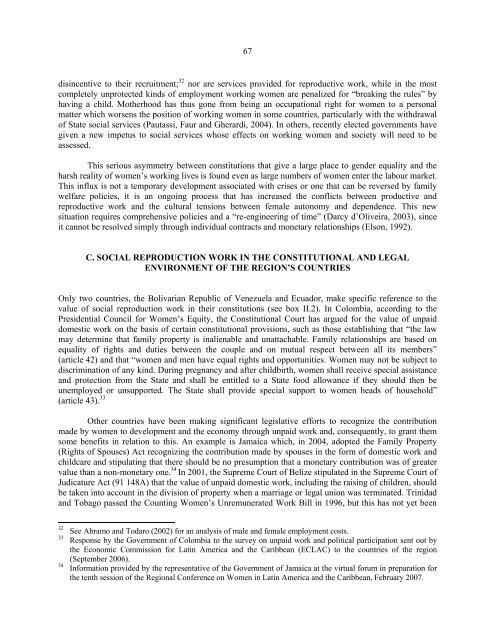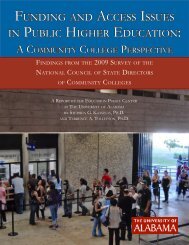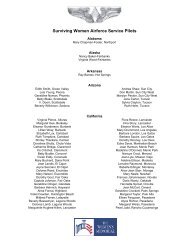Women in Latin America and the Caribbean - Cepal
Women in Latin America and the Caribbean - Cepal
Women in Latin America and the Caribbean - Cepal
Create successful ePaper yourself
Turn your PDF publications into a flip-book with our unique Google optimized e-Paper software.
67<br />
dis<strong>in</strong>centive to <strong>the</strong>ir recruitment; 32 nor are services provided for reproductive work, while <strong>in</strong> <strong>the</strong> most<br />
completely unprotected k<strong>in</strong>ds of employment work<strong>in</strong>g women are penalized for “break<strong>in</strong>g <strong>the</strong> rules” by<br />
hav<strong>in</strong>g a child. Mo<strong>the</strong>rhood has thus gone from be<strong>in</strong>g an occupational right for women to a personal<br />
matter which worsens <strong>the</strong> position of work<strong>in</strong>g women <strong>in</strong> some countries, particularly with <strong>the</strong> withdrawal<br />
of State social services (Pautassi, Faur <strong>and</strong> Gherardi, 2004). In o<strong>the</strong>rs, recently elected governments have<br />
given a new impetus to social services whose effects on work<strong>in</strong>g women <strong>and</strong> society will need to be<br />
assessed.<br />
This serious asymmetry between constitutions that give a large place to gender equality <strong>and</strong> <strong>the</strong><br />
harsh reality of women’s work<strong>in</strong>g lives is found even as large numbers of women enter <strong>the</strong> labour market.<br />
This <strong>in</strong>flux is not a temporary development associated with crises or one that can be reversed by family<br />
welfare policies, it is an ongo<strong>in</strong>g process that has <strong>in</strong>creased <strong>the</strong> conflicts between productive <strong>and</strong><br />
reproductive work <strong>and</strong> <strong>the</strong> cultural tensions between female autonomy <strong>and</strong> dependence. This new<br />
situation requires comprehensive policies <strong>and</strong> a “re-eng<strong>in</strong>eer<strong>in</strong>g of time” (Darcy d’Oliveira, 2003), s<strong>in</strong>ce<br />
it cannot be resolved simply through <strong>in</strong>dividual contracts <strong>and</strong> monetary relationships (Elson, 1992).<br />
C. SOCIAL REPRODUCTION WORK IN THE CONSTITUTIONAL AND LEGAL<br />
ENVIRONMENT OF THE REGION’S COUNTRIES<br />
Only two countries, <strong>the</strong> Bolivarian Republic of Venezuela <strong>and</strong> Ecuador, make specific reference to <strong>the</strong><br />
value of social reproduction work <strong>in</strong> <strong>the</strong>ir constitutions (see box II.2). In Colombia, accord<strong>in</strong>g to <strong>the</strong><br />
Presidential Council for <strong>Women</strong>’s Equity, <strong>the</strong> Constitutional Court has argued for <strong>the</strong> value of unpaid<br />
domestic work on <strong>the</strong> basis of certa<strong>in</strong> constitutional provisions, such as those establish<strong>in</strong>g that “<strong>the</strong> law<br />
may determ<strong>in</strong>e that family property is <strong>in</strong>alienable <strong>and</strong> unattachable. Family relationships are based on<br />
equality of rights <strong>and</strong> duties between <strong>the</strong> couple <strong>and</strong> on mutual respect between all its members”<br />
(article 42) <strong>and</strong> that “women <strong>and</strong> men have equal rights <strong>and</strong> opportunities. <strong>Women</strong> may not be subject to<br />
discrim<strong>in</strong>ation of any k<strong>in</strong>d. Dur<strong>in</strong>g pregnancy <strong>and</strong> after childbirth, women shall receive special assistance<br />
<strong>and</strong> protection from <strong>the</strong> State <strong>and</strong> shall be entitled to a State food allowance if <strong>the</strong>y should <strong>the</strong>n be<br />
unemployed or unsupported. The State shall provide special support to women heads of household”<br />
(article 43). 33<br />
O<strong>the</strong>r countries have been mak<strong>in</strong>g significant legislative efforts to recognize <strong>the</strong> contribution<br />
made by women to development <strong>and</strong> <strong>the</strong> economy through unpaid work <strong>and</strong>, consequently, to grant <strong>the</strong>m<br />
some benefits <strong>in</strong> relation to this. An example is Jamaica which, <strong>in</strong> 2004, adopted <strong>the</strong> Family Property<br />
(Rights of Spouses) Act recogniz<strong>in</strong>g <strong>the</strong> contribution made by spouses <strong>in</strong> <strong>the</strong> form of domestic work <strong>and</strong><br />
childcare <strong>and</strong> stipulat<strong>in</strong>g that <strong>the</strong>re should be no presumption that a monetary contribution was of greater<br />
value than a non-monetary one. 34 In 2001, <strong>the</strong> Supreme Court of Belize stipulated <strong>in</strong> <strong>the</strong> Supreme Court of<br />
Judicature Act (91 148A) that <strong>the</strong> value of unpaid domestic work, <strong>in</strong>clud<strong>in</strong>g <strong>the</strong> rais<strong>in</strong>g of children, should<br />
be taken <strong>in</strong>to account <strong>in</strong> <strong>the</strong> division of property when a marriage or legal union was term<strong>in</strong>ated. Tr<strong>in</strong>idad<br />
<strong>and</strong> Tobago passed <strong>the</strong> Count<strong>in</strong>g <strong>Women</strong>’s Unremunerated Work Bill <strong>in</strong> 1996, but this has not yet been<br />
32<br />
33<br />
34<br />
See Abramo <strong>and</strong> Todaro (2002) for an analysis of male <strong>and</strong> female employment costs.<br />
Response by <strong>the</strong> Government of Colombia to <strong>the</strong> survey on unpaid work <strong>and</strong> political participation sent out by<br />
<strong>the</strong> Economic Commission for Lat<strong>in</strong> <strong>America</strong> <strong>and</strong> <strong>the</strong> <strong>Caribbean</strong> (ECLAC) to <strong>the</strong> countries of <strong>the</strong> region<br />
(September 2006).<br />
Information provided by <strong>the</strong> representative of <strong>the</strong> Government of Jamaica at <strong>the</strong> virtual forum <strong>in</strong> preparation for<br />
<strong>the</strong> tenth session of <strong>the</strong> Regional Conference on <strong>Women</strong> <strong>in</strong> Lat<strong>in</strong> <strong>America</strong> <strong>and</strong> <strong>the</strong> <strong>Caribbean</strong>, February 2007.











